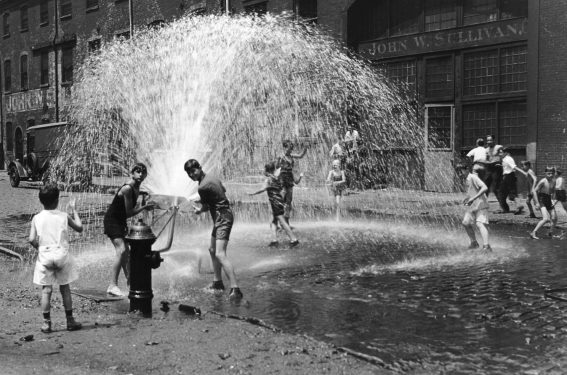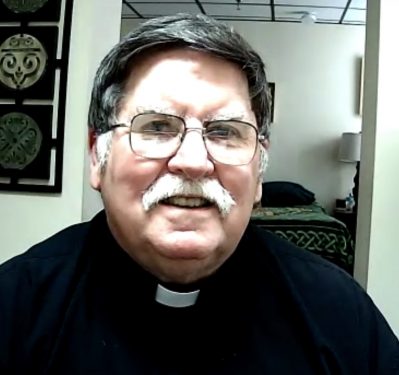
SUNSET PARK — Imagine a time with no cell phones and no Internet — a time when, instead of staying inside to try to stay cool, kids in Brooklyn ventured outside into summer’s sweltering heat.
Father John McKenna fondly recalls such evenings during the early 1960s in his old Sunset Park neighborhood on the borough’s southwestern edge and has preserved those memories in poetry.
He’s written about the sights, sounds, and aromas that filled the humid air on those sultry early evenings — of kids screeching and laughing while playing Buck-Buck, Red Rover, and stickball; or dancing in the powerful spray of an open fire hydrant. Or of radios blasting Elvis tunes being spun by “Cousin Brucie,” the legendary Brooklyn-born disc jockey Bruce Morrow.
Father McKenna captured all of these experiences and more in his poem, “A Summer Night Circa 1961.” It starts:
The block was mostly empty
During the humid afternoon.
Then after supper, it stirred into life
The hydrant at the corner was opened
Car-washing the long 1950s cars.
The cops came to turn it off.
Till it was opened again.
Another stanza reads:
Tons of kids were running around
Always running
Stickball games, a standoff
Between cars
Coming down the street.
And the serious city sport.
The best could hit the Spalding
(Pronounced Spal-deen)
An elderly Italian nonna
Perched on a pillow
At a second-floor window,
Watching the life on the street.
“A Summer Night Circa 1961” is 673 words long. It evolved from work Father McKenna did as he compiled the history of the parish of his youth, Our Lady of Perpetual Help in Sunset Park.
“For a few years, I had the opportunity of working in my home parish, from 2011 to 2019,” said Father McKenna, who currently works at St. Mary’s Parish Annapolis, Maryland.

He remembers how Our Lady of Perpetual Help’s pastor, Father James Gilmour, learned that he grew the parish “and had great memories.”
“He asked me to kind of be in charge of the 125th-anniversary celebrations,” Father McKenna said. “It was a wonderful experience for me. I wrote a number of articles in the vein of, ‘In this parish, do you remember when?’”
But those celebrations also honored modern-day parishioners. Each Sunday, at Our Lady of Perpetual Help’s historic basilica, Mass is celebrated in Spanish, Chinese, Vietnamese, and English. That meant he would have to rely on his own memories — and on the reminiscences of former and current parishioners — to get the history right.
Father McKenna took the assignment seriously — and had his work cut out for him — because virtually no one from his old neighborhood still lives there. Many started to leave in the 1970s.
“Like so many Brooklyn parishes, many of the people, the families that I (knew) had moved,” he explained. “If you’re a New Yorker, you might remember how nasty the city was in those years.
“There were 2,000 murders a year, graffiti was everywhere,” he recalls, “and I think a lot of people got afraid, including my own family. They sold their homes.
“So now, a very large part of the people who love Our Lady of Perpetual Help are living in Breezy Point, are living on Staten Island, or living in Toms River, New Jersey.”
The articles appeared in 2017 on the parish’s 125th anniversary Facebook page and in its Monthly Messenger.
But during that process, Father McKenna developed a technique — inspired by what stirred his senses while growing up on 59th Street — that worked for him. He picked words for those memories and wrote them down in a free-form stream of consciousness. It’s a technique, he said, that resembles poetry.
“It’s someplace between prose and poetry,” he said with a chuckle. “I often call it a ‘prosetry.’
“I have to have a piece of paper nearby because I might lose those words — they just kind of tumble out. I can never program when the Muses will come. They don’t visit me very often.”
But that’s how he created “A Summer Night Circa 1961.”
“I have a couple of things that I’ve kept,” he said of his writings, “but I wouldn’t consider myself a poet by any means.”
Still, Father McKenna managed to tell a story with short staccatos of verses. In contrast to the aforementioned nonna, he offered this:
There were crabby old ladies who thought
They “owned” the block.
No one liked them, not even the adults.
They only came out to yell at kids,
“Go down (or up) the street where you belong.”
The boisterous kids respond:
“Hey, we belong here. This is our block!”
One of those “poems” contrasted the joy of “snow days” of childhood with the drudgery facing an adult responsible for shoveling fresh-fallen drifts.
Snow,
A problem, a hassle,
A burden and a worry.
I don’t like being an adult.
I want to feel the delight of a snow day!
I want to fall into a snowbank,
Flap my arms, and make a snow angel.
But what if I can’t get up?
Father McKenna said Our Lady of Perpetual Help’s 125th anniversary accomplished its goal of honoring the past while also celebrating the heritages of modern-day parishioners.
He said there was an opening Mass, a block party with outdoor Mass, a homecoming Mass, a dance, and “an international night of foods from all the countries of the parishioners in the parish.
“We collected artifacts for a time capsule that was buried after the final Mass,” he said.
Now that anniversary is part of history, yet Father McKenna still fondly reflects on his youth.
“As summer approaches, these, I think, are common or similar memories of anyone from my generation from the Diocese of Brooklyn,” he said. “There was so much life on every street.
“I don’t think my street was in any way unique, except that it was ours.”
Here is Father McKenna’s complete summertime poem:
A Summer Night
Circa 1961
The block was mostly empty
During the humid afternoon.
Then after supper, it stirred into life
The hydrant at the corner was opened
Car-washing the long 1950s cars.
The cops came to turn it off.
Till it was opened again.
Elvis Presley playing on WABC
Cousin Brucie making us feel cool.
Tons of kids were running around
Always running
Stickball games, a standoff
Between cars
Coming down the street
And the serious city sport.
The best could hit the Spalding
(Pronounced Spal-deen)
Three sewers.
Other games,
Slap ball, stoop ball
Roughhousing games
Like poison ball, Buck Buck, Red Rover,
Quieter games too:
Bottle caps, Parcheesi on a hot stoop
Flipping, trading or pitching baseball cards
Still smelling of bubble gum
Bought from the candy store.
Where you could get candy, sure,
But also kites, yo-yos, tops, pea shooters
Oak tag for school projects,
Crayons, greeting cards, Elmer’s Glue
Slim Jims, stamps.
Pretzels and Wise Potato Chips
A large soda cooler
Promised refreshment
Coke and Pepsi
But also Hires Root Beer
Mission Orange Soda
Hoffman’s Ginger Ale.
And Yogi Berra’s Yoo-hoo.
A phone booth in the back
Young men talking to girlfriends
Out of parent’s earshot
Bookies placing bets.
Who knows?
Maybe even Clark Kent
Changing into his Superman gear!
The girls too played.
Not as much running, not as rough
They jumped rope, singing songs
Cadences setting a beat
Telling them when to jump.
They liked roller skating
Like figure skaters.
They played house with dolls, and
A stupid game (boy’s opinion)
The Game of Life.
All were in love with Rickey Nelson.
They talked and giggled a lot.
The adults then came out to sit in the aerie
To catch a breath on the languid nights.
An elderly Italian nonna
Perched on a pillow
At a second-floor window,
Watching the life on the street.
There were crabby old ladies who thought
They “owned” the block.
No one liked them, not even the adults.
They only came out, to yell at kids,
“Go down (or up) the street where you belong.”
“Hey, we belong here. This is our block!
You’re as mean
As the Wicked Witch
In the Wizard of Oz.”
At least I wanted to say that
But talking back to adults
Was a big no-no.
People walking up from the subway,
Sweat stains, exhausted after a day’s work
Riding the airless subway cars
Dropping into the candy store
For Chesterfields, and the evening
Daily Mirror
Just trying to make it home
To change into shorts
And sit on the stoop
With a cold Schaefer and a transistor
Listening to folksy Mel Allen
Describe the Home Run race
Of Maris and Mantle
Pursuing the Babe’s record.
Good Humor and Bungalow Bar trucks arrived
Rivaling for business.
Kids begging money from their folks
Or better, their grandparents.
Orange cream popsicles
Ice cream sandwiches.
Then a newcomer
Mister Softee with its annoying jingle,
Soft custard ice cream
Not as good as Karl Droge
But closer.
Down the block would come
Trucks with small amusement park rides
Vying for the attention and money
“Either a ride on the whip,
Or get an ice cream, but not both.”
Faced with that terrible choice,
Ice cream usually won.
On the 4th of July
The block became a war zone
The block dressed in flags.
At night the battle began.
Ash cans, cherry bombs, Roman Candles
And whole packs of firecrackers
And even mats (144) going off
In rapid succession
The smell of gunpowder
Filling the humid night air.
Huffy and Schwinn bikes were clothespinned
With baseball cards clicking on the spokes
Imitating motorcycle roars.
New stove or refrigerator cardboard boxes
Became tanks caterpillaring down the block,
Or forts like the Alamo.
Finally it was too dark to play
But too early to go to bed
The Andy Griffith show
Gilligan’s Island
Father Knows Best
The Wonderful World of Disney
On a small black-and-white TV.
Summer days of innocence.
Happening nightly
On each block
Of OLPH parish
A long time ago.
